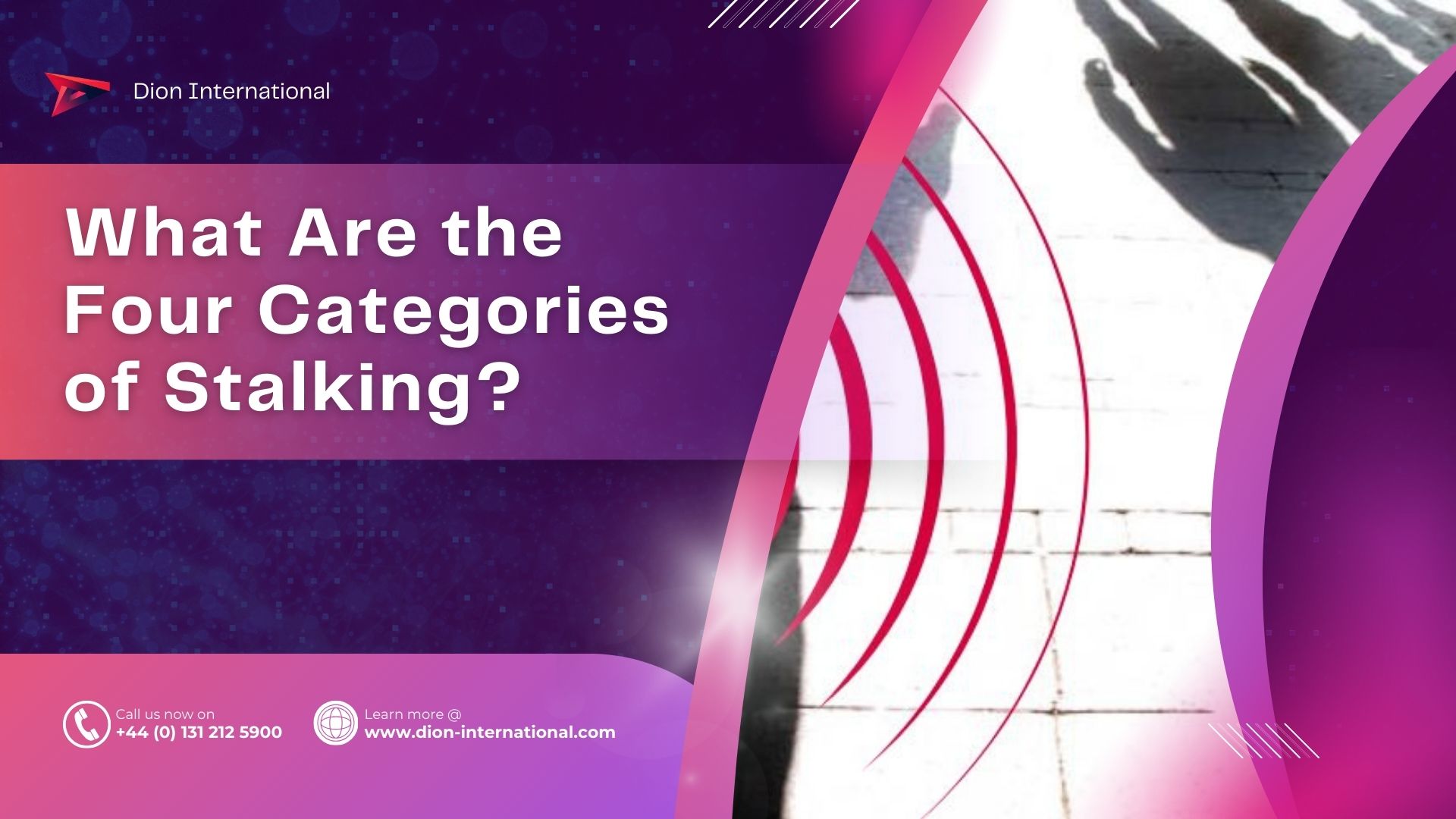Stalking is a highly intrusive and potentially dangerous pattern of behaviour that causes significant psychological harm and can escalate into violence. In the UK, stalking is not defined solely by one type of act but by a pattern of persistent and unwanted conduct that causes alarm, distress, or fear. Recognising and understanding the different behavioural categories of stalking is critical for victims, investigators, and professionals working in security and law enforcement.
Drawing on widely accepted behavioural models, including those promoted by UK policing and risk management frameworks, stalking can be broken down into four core categories:
- Surveillance
- Life Invasion
- Intimidation
- Interference (Sabotage or Attack)
Below, we examine each in depth, and explain why Dion International is uniquely positioned to assist those affected.
1. Surveillance: The Eyes That Never Blink
Surveillance is often the first phase of stalking behaviour. It includes observing, following, or gathering information about the victim without their knowledge or consent. It may seem passive, but the psychological impact of realising you’re being watched is profound and distressing.
Common behaviours
- Following the victim or tracking their movements.
- Sitting outside their home, workplace, or frequent locations.
- Using GPS tracking devices or covert cameras.
- Monitoring online activities or collecting personal data.
Risks
Surveillance may escalate quickly to more intrusive acts. Victims often experience heightened anxiety, feel unsafe in public, and may change their routine out of fear. In many cases, the stalker is attempting to control or possess the victim through omnipresent observation.
2. Life Invasion: Breaking into the Personal Space
Life invasion involves direct and unwanted contact or interference with the victim’s personal life. Unlike surveillance, which can remain hidden, life invasion is noticeable, disruptive, and often deeply frightening.
Common behaviours
- Repeated unwanted messages, calls, emails, or visits.
- Sending unsolicited gifts.
- Following the victim online and posting about them.
- Turning up at social or work events uninvited.
Impact
This behaviour causes distress and violates the victim’s sense of privacy. Victims may feel that they can’t escape the stalker’s attention—even in their own home. It often leads to social withdrawal and mental health decline.
3. Intimidation: Fear as a Weapon
Once a stalker realises they’re not getting the reaction they want, the tactics may escalate into intimidation. This includes threats—either explicit or implied—and attempts to frighten the victim into submission or silence.
Common behaviours
- Making threats of violence (direct or veiled).
- Damaging property as a warning.
- Threatening to release private information or images.
- Targeting friends or family to isolate the victim.
Consequences
Intimidation not only increases the victim’s emotional trauma but also presents a serious risk to their physical safety. The fear of escalation can be paralysing, leading victims to avoid law enforcement or legal help.
4. Interference: Sabotage and Direct Attack
This is the most extreme and dangerous phase of stalking behaviour. It moves beyond emotional and psychological abuse into actions that directly harm the victim’s wellbeing, livelihood, or physical safety.
Examples include
- Tampering with a victim’s car or property.
- Interfering with their employment or damaging their reputation.
- Breaking into their home or place of work.
- Physically assaulting the victim or their loved ones.
Legal implications
These behaviours are not only terrifying—they are often criminal offences under UK law, including harassment, criminal damage, trespass, and assault. Victims at this stage are in urgent need of protection and professional intervention.
Why Stalking Must Be Taken Seriously
Research shows that stalking rarely stops on its own and can escalate in severity over time. It is often a precursor to more serious crimes, including physical assault or even homicide. Victims experience:
- Depression and anxiety
- PTSD symptoms
- Loss of employment or education
- Relationship breakdowns
- Constant fear and hypervigilance
- Social withdrawal and isolation
Early identification and intervention are essential. The sooner stalking behaviour is recognised and responded to, the better the outcome for the victim.
UK Law and Protection for Victims
In the UK, stalking is a criminal offence under the Protection from Harassment Act 1997 (as amended by the Protection of Freedoms Act 2012). Victims have legal options including:
- Non-molestation and restraining orders
- Reporting to police for criminal investigation
- Seeking support through victim services
- Documenting incidents for evidential timelines
However, law enforcement response can vary, and that’s where private sector professionals like Dion International step in to bridge the gap.
Why Choose Dion International
Dion International provides discreet, professional, and lawful surveillance and investigation services to clients across the UK. Our operatives are trained in both private and government intelligence methodologies and follow all UK legal standards. We are well-versed in understanding the behaviour patterns that characterise stalking and are equipped to collect admissible evidence to support legal proceedings.
What We Offer
- Threat assessments and risk management.
- Covert surveillance to confirm stalking behaviour.
- Counter-surveillance services to identify and expose stalkers.
- Liaison with legal and law enforcement teams.
- Emotional support and clear action plans for clients under distress.
- Evidence packages prepared to support legal proceedings and protective orders.
If you believe you are being stalked, don’t minimise it — document everything, seek support, and act early.
Whether you’re a private individual or a business executive facing harassment, our tailored strategies ensure your safety and peace of mind.
Stalking is not always about a one-off message or casual encounter—it’s a pattern of behaviour designed to instil fear, dominate, or punish. Understanding the four categories—surveillance, life invasion, intimidation, and interference—can help victims and professionals recognise when a situation is escalating and intervene appropriately.
If you or someone you know is experiencing stalking, don’t face it alone. Professional help is available. Dion International stands ready to assist with experience, empathy, and the expertise required to keep you safe and secure.







